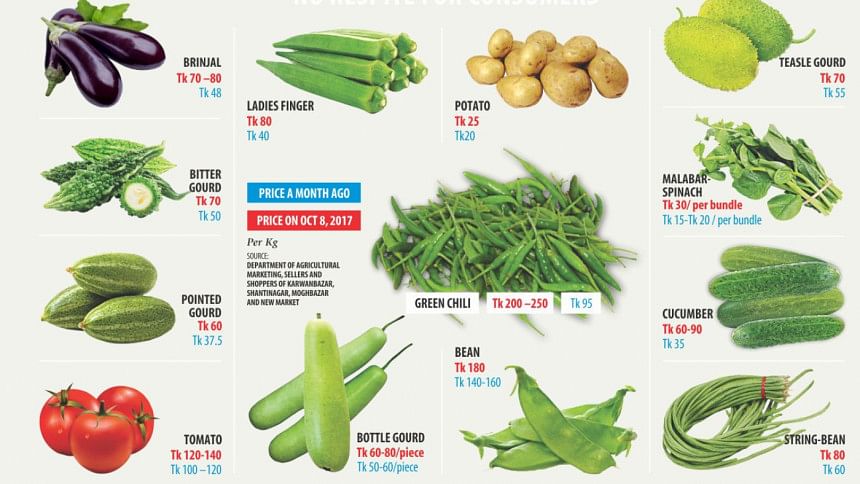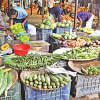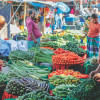Veg prices soaring

Picking up a bitter gourd at Karwan Bazar Kitchen Market, Ahammad Hossain asked the seller for its price. Upon hearing the reply, Ahammad's face instantly fell.
"It's 100 taka. Don't bargain. Take it or leave it," the seller said.
“It's small and can only serve two people. At most it should cost Tk 40. How can you ask for such a price?” Hossain, an employee of a private firm asked. As the shopkeeper did not relent, Hossain left the shop after buying a half kg of teasle gourd, locally known as kakrol, at Tk 35.
Due to flood and heavy rainfall, this year's crops were badly damaged and this created a shortfall in its supply triggering a crisis at the kitchen markets and subsequently increasing the price of vegetables, according to retailers, wholesalers and the Department of Agricultural Marketing.
Mostafa Kamal, owner of the vegetable wholesale shop “Gawsia Bhandar”, said a month ago he received a supply of five to six trucks of vegetables. “Now, the supply has become half and I receive only two to three trucks,” he said.
Vegetables usually come to Karwan Bazar from northern districts that include Rangpur, Rajshahi, Mymensingh, Bogra, Chuadanga and Dinajpur, he said.
“Right now I'm getting supply of vegetables only from Chuadanga,” he said, adding he has not seen such a crisis in the last two decades.
“Due to flood and heavy rainfall crops are damaged. On the other hand, the period of cultivation of summer vegetables is ending. That is why there is a shortfall of supply in the market,” said Abdur Rashid, Deputy Director (Market Intelligence and Statistics), Department of Agricultural Marketing.
“The situation will continue until winter vegetables arrive in the market,” he added.
To cope with the soaring price, many families have reduced their consumption.
Enamul Haq, a small trader in the capital's Moghbazar area, confirmed that the price of essentials, especially vegetables, have increased suddenly in the last couple of days.
“I bought a kg of eggplant for Tk 80, but a week ago I bought the same for Tk 40,” he said.
Tanjina Sultana, a university student who came to a vegetable market in the New Market area, said the price of most of the vegetables were above Tk 60, although the situation was different a week ago.
“I live in a university dorm. Students, especially the insolvent, are suffering a lot because of the hike. Even, some of my friends have decided not to eat vegetables,” she said.
Afzal Miah, a shopper in the same market, said he became surprised seeing the unusual price of green chillies, lemons and onions. The price hike is adding to the people's sufferings, he said.
Mohammad Kamal, a vegetable seller in Moghbazar, said, “The price of green chilli increased due to the crop damage during the recent floods. Now we are selling imported chilli. If the import could not be done, its price would increase more,” he claimed.
Visiting several markets of the capital, including Shantinagar, Moghbazar, New Market and Karwan Bazar, our correspondents found the sellers demanding high prices for fish also as there was no supply of hilsa due to the current ban.
“Before imposing the ban, the sales of other fish dropped as people preferred to buy hilsa. During those days, wholesalers had to stock ruhi, katla and other fish. Now they are selling the stock at a high price,” said Abdul Matin, who has been running his business for the last nine years at Shantinagar Kitchen Market.
Regarding the high price of fish, Rashid said, “It's temporary. Water is yet to recede in many places. As a result, less fish is being netted. Moreover, the ban on catching hilsa fish is another reason for the crisis.”
The increase of prices has also affected the sellers as consumption has reduced.
Roostom Kha, a vegetable trader of New Market, said that their sales have remarkably reduced due to the price rise.
“Now we do not have enough customers and our sales have fallen by Tk 1,000-2,000,” he said.
Rice is another essential experiencing an upward trajectory in its prices.
In the retail market, different varieties of rice are being sold at higher than usual prices. Najirshal is now sold at Tk 68-Tk 70 while the price of miniket fluctuated between Tk 60 and Tk 62. Coarse rice is sold at Tk 54 to TK 56 per kg.
About the price of rice, Shaheed Bhasani, a rice trader in Moghbazar, said the price of rice was decreasing due to a recent government initiative of meeting the demands of rice traders, millers and importers, in order to stabilise prices.
But there appeared to be no possibility of reducing the price further until new rice comes to the market two months later, he said.

 For all latest news, follow The Daily Star's Google News channel.
For all latest news, follow The Daily Star's Google News channel. 








Comments